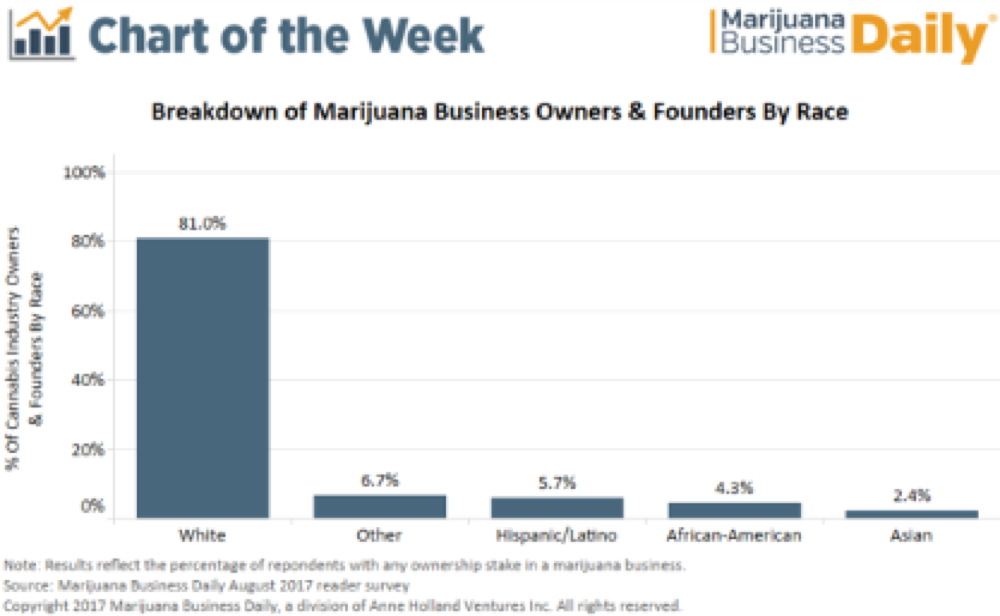Diversity in the Cannabis Industry: Working Towards Equal Access and Opportunity
As the BlackLivesMatter global network continues to raise awareness and bring justice to Black people around the world, many companies and industries have reflected on how they can increase diversity and promote economic empowerment for communities of color.

Many cannabis business leaders have acknowledged the industry’s lack of diversity, long before current events surrounding police brutality and racial tensions became a focal point in the United States. The cannabis industry has already started taking steps to become more racially diverse, but there is no doubt still a long way to go.
Why is Diversity Such a Problem in the Cannabis Industry?
Below is breakdown of marijuana business owners and founders by race, according to Marijuana Business Daily’s 2017 chart:

As you can see, 81% of marijuana business owners/founders are white, with only 5.7% identifying as Hispanic/Latino, 4.3% identifying as African-American and 2.4% identifying as Asian.
One of the biggest barriers is cost. State licensing and application fees can easily cost applicants six-digit figures, making it more of a challenge for people of color to get their cannabis business off the ground, due to many systemic barriers. Not all entrepreneurs have that kind of capital readily available, and the high financial fees make the industry exclusive to those who have more financial freedom and connections to wealthy investors.
Audio Player(Above) Barton Morris on Startup Nation’s “Inside Michigan Business” Podcast with John Gallagher and Jack Lessenberry, July 9th, 2020. Listen to full podcast episode.
With black people being 4 times more likely than whites to be arrested for marijuana possession historically, despite using marijuana around the same rate, it raises the question: what is being done to help increase racial diversity in the cannabis industry?
Michigan’s Social Equity Program
In order to promote and encourage participation in the cannabis industry, the Marijuana Regulatory Agency (MRA) launched Michigan’s Social Equity Program last year, which is a resource for communities and evaluates eligibility based on:
- Marijuana convictions.
- Poverty.
Those in eligible communities can receive fee reductions based on specific criteria. Additionally, the Social Equity Program focuses on those that have been disproportionately impacted by marijuana prohibition and enforcement. Since communities of color have been heavily impacted by the War on Drugs, many have criminal records for low-level marijuana crimes, which can disqualify them from applying and entering the industry.
Changes in legislature, such as the Michigan Clean Slate Initiative, could assist in reducing the number of people imprisoned with non-violent cannabis offenses and allow greater access into the industry. Clean Slate’s seven-bill package could greatly improve Michigan’s expungement system, but the bill is still pending.
The Takeaway
Appearing on the Jazz Cabbage Cafe podcast, July 14th, 2020
Continued policy considerations, social programming, and outreach initiatives will foster opportunity, equality and education in this ever-changing industry and promote positive practices. Working towards equal access and opportunity is essential to our communities and to the industry.
Categories
Cannabis Legal Group Free Consultation
Get in Touch With Michigan's Most Trusted Cannabis Law Firm
We’ve Been Helping Michigan Marijuana Businesses Lay the Groundwork for Long-Term Security and Success for Years, and We Can Help You, Too.
Phone Number:
(248) 301-0626
© Cannabis Legal Group. All rights reserved.

